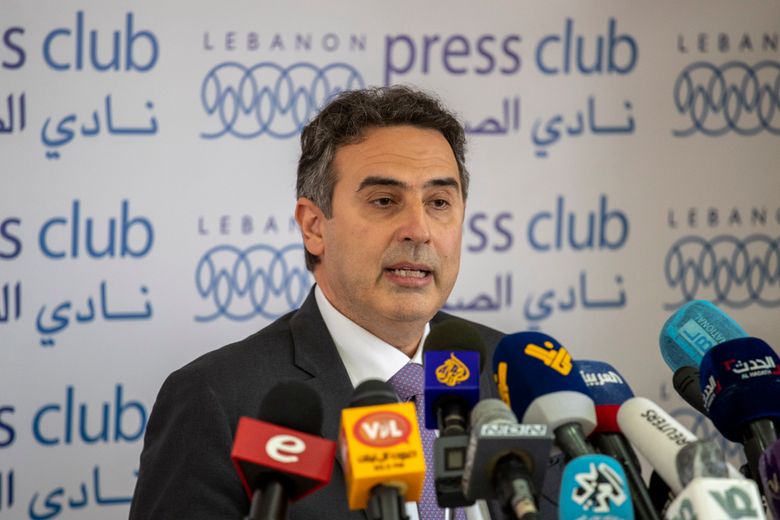A: Stealin' the children, land & vote. (or, you could just say gerrymandering).
Someone should check on Jim Jordan.
He may need some emotional support right about now.
First, this happened...
Senior Lebanese finance official resigns amid crisis
BEIRUT (AP) — The director general of Lebanon’s Finance Ministry, who was on the team negotiating an emergency bailout from the International Monetary Fund, resigned from his post on Monday amid a rapidly worsening economic and financial crisis.Alain Bifani, a veteran civil servant who held his post for two decades, said he was protesting the way leaders were handling the crisis and that he refuses to be a partner in what is happening.
Bifani’s resignation was the second in two weeks by a member of Lebanon’s negotiating team with the IMF — an indication of the gravity of the crisis and the difficulties facing those talks. Lebanon, one of the most indebted nations in the world, has asked the IMF for a bailout after defaulting on its sovereign debt, but the talks appear to be faltering, with hardly any progress made after more than 15 sessions.
A one-sentence statement by the Finance Ministry gave no details about Bifani’s resignation Monday other than to say that it was received by Finance Minister Ghazi Wazni.
The resignation came two weeks after Henri Chaoul, a financial adviser to the Lebanese government in the talks with the IMF, resigned, saying there is “no real will” for reforms in the country. Experts say Lebanon must crack down on corruption, overhaul its public service sector and improve tax collection, among other long-delayed reforms.
The resignations are a clear indication of the lack of faith in any serious reforms being adopted by the political class amid paralysis and infighting, despite the gravity of the crisis.
“I decided to resign because I refuse to be a partner or a witness to what is happening,” Bifani said during a news conference later Monday. “Everyone should take a clear stance and my decision came after all efforts for the rescue have run out.”
Bifani added that Lebanon will not be able to get any more international funding unless it carries out serious reforms. He added that a different performance is needed in the negotiations with the IMF in order for the talks to have a chance.
The small country is going through an unprecedented economic meltdown that has seen the local currency lose more than 80% of its value against the U.S. dollar in recent months amid soaring prices and popular unrest.
Chaoul, the financial adviser, later tweeted that with Bifani’s “resignation today, he proves that there is no space in the Lebanese landscape for reforms at all levels, including the financial sector.”
Last week, IMF Managing Director Kristalina Georgieva said that discussions with the Lebanese side have so far not led to a breakthrough on a financial assistance program.
“The core of the issue is whether there can be unity of purpose in the country that can then carry forward a set of very tough, but necessary measures,” Georgieva said.
Even as the spiraling crisis has significantly weakened Lebanon’s government, it has refused taken any concrete steps in fighting corruption or launching the badly needed reforms that the IMF and donor countries are demanding to help get the country back on track.
Bifani told the local Al-Jadeed TV earlier that his resignation is an expression of rejection to the way the ruling elite is dealing with the crisis. He added that the route taken in the country is “reckless” and this will badly hurt the public.
Then, this happened...
FBI raids offices at downtown One Cleveland Center building tied to Ukrainian oligarch
CLEVELAND, Ohio — The FBI on Tuesday raided the Cleveland offices of a company with ties to a Ukrainian oligarch that owns several downtown buildings.
FBI spokeswoman Vicki Anderson said agents searched the offices of Optima Management Group in One Cleveland Center at East 9th Street and St. Clair Avenue. A spokesman for the IRS also said his agency’s investigators were present.
 |
| "Doesn't this just remind you of Detroit?" |
Anderson said agents also executed search warrants at an office in Miami.
Federal authorities in Cleveland have been conducting a wide-ranging probe involving Ukrainian oligarch Igor Kolomoisky that has been ongoing for quite some time. Kolomoisky is a principal of the Privat Group, a large Ukrainian business company, and principals of the company are also part of Optima.
Case ID: 2019-0377 - JOINT STOCK COMPANY VS IGOR VALERYEVICH KOLOMOISKY
Filing Date: Tuesday , May 21st, 2019
Type: 2A - CIVIL ACTIONS
Status: ACTIVE - ACTIVE
Optima had a much larger presence in Cleveland about a decade ago when it bought several buildings under the leadership of executive Chaim Schochet. Its presence in Northeast Ohio has dwindled in recent years.
Optima also controlled Warren Steel Holdings, a mill northwest of Youngstown that closed in 2016.
Kolomoisky and a fellow Ukrainian billionaire formed PrivatBank in the early 1990s. It became one of the Ukraine’s key financial institutions, according to Forbes. The Ukrainian government nationalized the bank in 2016 after an investigation suggested there was large-scale fraud over a decade-long period, Forbes reported.
The financial news outlet places Kolomoisky’s net worth at about $1 billion. He remains a complicated political figure in his home country. He is a former governor of Ukraine’s Dnipropetrovsk region.
Published reports said that Kolomoisky had refused to set up a meeting with President Donald Trump’s ally Rudy Giuliani and Ukrainian President Volodymyr Zelensky in an attempt to dig up dirt against Democratic presidential nominee Joe Biden last year.
Kolomoisky’s attorney Michael Sullivan declined comment.
Then, this happened...
Beirut explosion rocks Lebanon's capital city
Voting is beautiful, be beautiful ~ vote.©

No comments:
Post a Comment